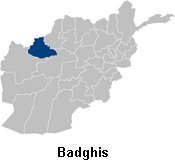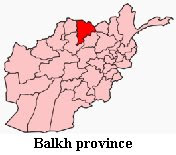Karzai's latest offer:
Hamid Karzai offers protection for Taliban leader as incentive for talks
KABUL, Nov 16 (AP) - Hamid Karzai, today offered to provide security for the Taliban's reclusive leader, Mullah Omar, if he agrees to enter peace talks, saying the US and other nations could remove him as Afghanistan's president if they disagree.
His comments come as international political and military leaders are increasingly mulling whether negotiating with the Taliban is necessary as the insurgency gains sway in large areas of Afghanistan.
Karzai has long supported drawing the Islamist militia into the political mainstream on the condition that they accept the country's constitution.
"If I say I want protection for Mullah Omar, the international community has two choices: remove me or leave if they disagree," Karzai said in an hour-long press conference in Kabul.
"If I am removed in the cause of peace for Afghanistan by force by them, than I will be very happy. If they disagree, they can leave. But we are not at that stage yet." (link)
The note of defiance in Karzai's voice is unmistakable, a step up from his first communication aimed at Barack Obama on November 5 when Karzai issued a "demand" to end civilian casualties following the deaths of an estimated 40 wedding goers in Kandahar province.

But Karzai's pose may not serve him well, as the ghost of Ngo Dinh Diem could tell him. Diem, the South Vietnamese leader appointed by the US in 1955, had built up a family fiefdom to make the Karzais jealous. His family filled out the cabinet while his brother Ngo Dinh Can "ran the northern provinces around Hue without any nominal post whatsoever" (Gabriel Kolko,
Anatomy of a War, 86). Today, Hamid Karzai's brother
Ahmed Wali Karzai similarly reins over Kandahar province in the south. As an Afghan Interior Ministry official told one journalist, “He is the unofficial regional governor of southern Afghanistan and leads the whole [drug] trafficking structure.”
In June of 1963 Diem's South Vietnam regime, secretly and without the American's knowledge, contacted North Vietnam for talks. By this time, "[m]ost US advisors believed that the Diem regime was rapidly losing the war," (Kolko, 118) and the secret talks were the last straw. Soon,

Washington gave the green light for a military coup, with full knowledge that Diem would likely be assassin- ated to prevent his return to power. Soon after that, Diem was dead following a coup approved by JFK. His government, according to Kenndy's ambassador to South Vietnam
Henry Cabot Lodge, had been another of "the very unsatisfactory governments through which we have had to work in our many very successful attempts to make these countries strong enough to stand alone." (Marilyn Young,
The Vietnam Wars, 100)
The Afghan government, filled as it is with warlords and other criminals, is arguably another in a long line of "very unsatisfactory governments." And so it may be time to cut them loose, say some insiders. Writing in the Herald Tribune, South Asia specialist Daniel Markey of the Council on Foreign Relations says American officials are concerned over Karzai's newfound shrill populism and are wondering whether it's time to show him the door:
The Karzai question
By Daniel S. Markey
[A]n enormous gap still looms in U.S. policy: No one is sure what to do about President Hamid Karzai. Elections are scheduled for next fall, and the Afghan capital is buzzing with questions about whether Karzai can, or should, win another five-year term.
It would be nice to say that America should support the principle of free Afghan elections, and focus on process over personalities. Indeed, the defense of Afghanistan's nascent electoral institutions and culture is a worthy cause in and of itself. But Washington's unmatched influence in Kabul means that it cannot sit impassively - inaction will send as loud a message as action...
But practically any conversation in Kabul quickly exposes a wide range of harsh anti-Karzai criticism. Many international officials cite the alleged corruption of his family and political allies, note that he has proven himself a decidedly ineffective institution builder, and voice concern over his increasingly shrill, populist rhetoric. (link)
Note the reasoning Markey offers for why the US cannot be distracted by free elections: Since the US already controls Afghanistan, an election is sort of a farce anyway.
Related:























